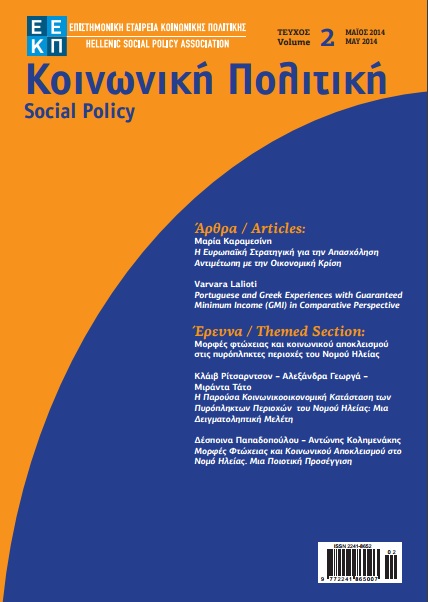Η Παρούσα Κοινωνικοοικονομική Κατάσταση των Πυρόπληκτων Περιοχών του Νομού Ηλείας: Μια Δειγματοληπτική Μελέτη

Abstract
The socioeconomic consequences of the catastrophic fires of 2007 inEliasPrefecturewere investigated in a sample survey of 1529 residents in the fire-affected districts in 2012. The population of this chiefly mountainous area is elderly (a quarter over 65) and has low education (45% no higher than primary). There are few employment opportunities and most of the labour force is self-employed in agricultural or other occupations. Half the population believes that their economic situation has worsened since the fires. However, most blame this entirely or partly on the economic crisis. Housing problems were to a large extent said to be long-standing ones that also were not principally caused by the fires. The survey did not reveal acute social exclusion at present but the population is vulnerable to poverty and geographical exclusion in particular.
Article Details
- How to Cite
-
Ρίτσαρντσον Κ., Γεωργά Α., & Τάτο Μ. (2017). Η Παρούσα Κοινωνικοοικονομική Κατάσταση των Πυρόπληκτων Περιοχών του Νομού Ηλείας: Μια Δειγματοληπτική Μελέτη. Social Policy, 2, 47–62. https://doi.org/10.12681/sp.10555
- Issue
- Vol. 2 (2014)
- Section
- Articles

This work is licensed under a Creative Commons Attribution 4.0 International License.
Authors who publish with this journal agree to the following terms:
Authors retain copyright and grant the journal right of first publication with the work simultaneously licensed under a Creative Commons Attribution Non-Commercial License that allows others to share the work with an acknowledgement of the work's authorship and initial publication in this journal.
Authors are able to enter into separate, additional contractual arrangements for the non-exclusive distribution of the journal's published version of the work (e.g. post it to an institutional repository or publish it in a book), with an acknowledgement of its initial publication in this journal.
Authors are permitted and encouraged to post their work online (preferably in institutional repositories or on their website) prior to and during the submission process, as it can lead to productive exchanges, as well as earlier and greater citation of published work.


